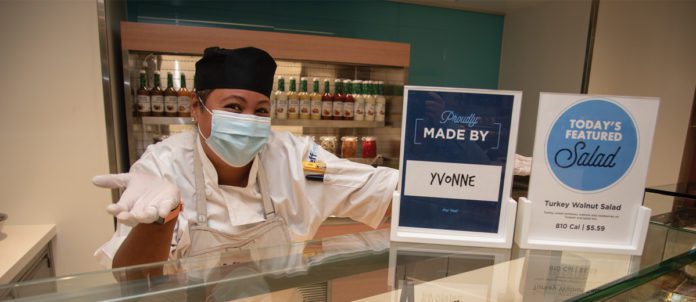As in all areas of the foodservice-and-hospitality industry, the pandemic brought swift and dramatic change to every area of the contract-catering business. Overnight, businesses, high schools, universities and colleges, recreation and leisure centres closed — and the companies that serviced their foodservice operations had to adapt while aligning with new and varied provincial legislation. Meanwhile, the hospital and long-term care sectors were under very different pressure and the response of their foodservice providers was equally swift — and dramatic.
The contract-catering market is one of the largest segments of the foodservice industry in Canada, reaching its peak in 2019 at $4.7 billion, according to Stastica. As a result of the pandemic, total revenues shrunk 35 per cent, however, in 2021 revenue rebounded significantly,
with an even stronger recovery projected for 2022 and beyond.
Contract catering continues to be dominated by ‘the big three’’ — Aramark, Compass Group PLC and Sodexo. All three companies serve the education, business and industry, healthcare, senior living and remote-camp marketplaces across Canada. In recent years, Canadian-owned Dana Hospitality, which was acquired by The Dexterra Group in December 2020, has grown its market share significantly, particularity in the education and corporate marketplaces, to become an important member of the contract-catering community.
Pause, Re-evaluate and Re-invent
Throughout the pandemic, the one universal priority for all contract-catering companies continues to be the health and safety of their employees, clients and customers. Each of the major providers developed unique and stringent wellness and safety protocols, which included ongoing communication with their clients and onsite teams, safety training and checklists for employees and adaptations in menu, service delivery and dining protocols.
The pandemic also gave the industry, well known for its fast pace of change, time to pause, re-evaluate and re-position itself for the future. “Our first priority was to communicate with all our clients so we could understand their priorities. We then re-evaluated our service and delivery models to re-tool our operations for the future,” says Ross Munro, executive VP, Dana Hospitality.
Compass Group took a similar approach. “Rather than cut central costs, we invested in our culinary and innovation teams to better prepare for the future,” explains Michelle Pereira, VP, Culinary and Guest Experience.
Sodexo also paused and invested in its business, creating the Food Connection — an agile model that provided convenient on and off-site food options for its corporate and other sector clients. Sodexo also re-invested in its education market with the launch of its Imagine brand. Re-vamped and curated by chefs and specialists in Canada, its focus is on enhancing the experience and engagement of students. Its launch included the Uniquely Canadian Love of Food e-cookbook featuring recipes from Sodexo chefs and senior leaders.
Meanwhile Aramark took a step-by-step approach. “During each stage of the pandemic, we worked with our clients and operators to create unique procedures and systems to meet individual account needs,” explains Louise Hudson, VP of Marketing.
Technology is Key
Throughout the pandemic, contract caterers increased their use of robotics as customers looked for foodservice solutions that delivered customized menus in a safe and frictionless manner — meet Sally the Salad Robot. Introduced by both Aramark and Compass Group across all sectors, the robotic vending machine allows users to create their own customized meal using any combination of 22 ingredients. “For approximately $10, our customers create their own fresh meal, one of the most popular being yogurt bowls,” explains Hudson.
Pizza Forno is yet another tech innovation. It’s a 24/7 automated pizzeria that makes artisanal pizza fresh to order in just three minutes. Aramark negotiated an exclusive agreement with Pizza Forno, launching more than 10 machines across Canada. Selling for an average price of $14, each machine holds 70 pizzas with average sales peaking at 85 pizzas per day.
Robotics have also revolutionized how contract caterers are serving coffee, with Compass Group and Aramark piloting CoffeeBot, a frictionless coffee machine that serves freshly brewed, bean-to-cup coffee with a simple touch.
Other innovations being introduced into the marketplace include Food Lockers, a completely frictionless pre-order and pre-pay dining-service solution. Introduced by both Compass Group and Aramark in their education and manufacturing sectors, it’s ideal for customers on the go.
“Customers use Aramark’s Hey Chef App to place their order, specify a pick-up time, then use a unique QR code to access the locker. After the food is picked up, the locker is automatically sanitized for use by the next customer,” explains Hudson.
Social Engagement
The contract-catering sector has increasingly turned to social media to engage with their customers. “Aramark’s customers made it clear that they’re interested in having a say in what we offer them. Two such examples are our Tuesday Choose-Day, where customers vote for their next pop-up, and Napkin Talk, where two-way feedback is shared using a QR code,” states Hudson.
“At Dana Hospitality, our students and customers are more interested in communicating with us than ever,” Munro adds. “We have campuses where we connect with 100 per cent of our students daily. Because all our menus are prepared from scratch with local ingredients, we let them know what is happening in our kitchens today. As they could not come to their dining hall to see our chefs in action, we create live videos of their chefs preparing their meal.”
According to Jae Doncillo, engagement specialist for Dana Hospitality, “As soon as the pandemic hit, our social-media engagement doubled and has continued to grow exponentially. We use Tik Tok, Snapchat and Instagram to share menus, events and feedback — all in real time. We’re also piloting Instagram as a frictionless e-commerce platform with great success, as it’s flexible and allows complete customization.”
Back to Work
As offices closed and employees moved to remote working, corporate dining was severely impacted. Now, with restrictions lifting, many employers want their employees to come back to their offices. However, a recent Harvard Business School online survey of 1,500 professionals finds only 18 per cent of respondents said they want to return to the office full-time, with 61 per cent saying they would like to continue to work from home part time.
Many business and industry leaders are turning to their foodservice partners as an incentive to bring people back to the office. “Companies are either subsidizing or paying for their employee’s lunch in our cafes to encourage them to return to the office. We need to be an active partner in their efforts to do so,” says Pereira.
Taking Care of People
The pandemic was extremely hard on the most important resource of contract catering industry — its people.
“The impact of the pandemic varied by sector and province. While many of our education and corporation operations closed or moved to a much-reduced service model, other sectors like healthcare and senior living had a desperate need for more staff. Aramark employees truly rose to this challenge, supporting each other — including volunteering to temporarily move across the country to work in those businesses in need,” says Hudson.
At Compass Group, technology played an important role in taking care of its staff. “As our employees could not meet in person, we utilized our Nudge App to update our teams on safety protocols, employee incentives, thank-you’s and just check in to see how they are doing,” explains Pereira.
As a result of the steep job losses in the contract-catering sector, many employees made the difficult decision to exit the industry.
“Hospitality companies have a strategic opportunity to again attract and retain talented employees. It will be an artform to do such as we need to build trust with them. Winning Canada’s Most Admired Corporate Culture was an important step forward in our ability do this,” states Pereira.
Meanwhile Aramark leveraged the power of its own people to attract and retain talent, creating a series of videos featuring its employees telling their own stories and commitment to servicing others.
In-house dining has changed forever
The pandemic disrupted every aspect of campus, corporate, healthcare and leisure life. However nowhere was this more evident than in the education marketplace. Contract caterers that traditionally operated all-you-care-to-dine or à la carte meal plans in large dining halls had to immediately pivot to takeout or pick-up service for those students, faculty and staff that remained on campus.
An important component in the success of this new service delivery model were customized pre-order and pre-pay Apps. “When the pandemic first hit, we immediately pivoted to an increased use of our mobile app, Hey Chef, to service take-out, delivery and residence dining orders,” explained Hudson.
Compass Group used the robust technological platform built by its Compass Digital Labs team to continue to provide customized Apps and frictionless delivery options for each of their major markets.
“As more of our customers migrated to our pre-order and pre-pay apps and other solutions, fewer people were ordering their food in person, so providing a robust digital experience became even more critical,” states Pereira.
A benefit to the use of mobile apps has been a significant increase in the average check size.
“We’ve seen an up to 47-per-cent increase in average check with mobile app users both with our internal and national brand partners,” comments Hudson.
Aramark also added new services, including curbside or vehicle delivery for groceries and to-go meals for its customers, which was particularly popular with healthcare workers. Dana Hospitality offered similar services, including online Farmer’s Baskets where its customers could purchase local produce, breads or chef-prepared meals or preserves.
Like all businesses and consumers across Canada, supplier shortages for food, packaging and other goods affected the contract-catering sector and the menus available. “At Dana Hospitality our onsite chefs have the freedom to prepare scratch-made menus using the best available ingredients versus a fixed, rotational menu. As a result, we were able to manage through supplier shortages more seamlessly,” explains Munro.
And while some of the menu, service and dining-pattern changes that came out of the pandemic will be temporary, many others will remain.
“Students in traditional all-you-care-to-eat dining centres became used to takeout service, which gave them the flexibility to dine wherever they cared to. Even when we return to full use of our dining halls, we expect to continue some hybrid service,” states Hudson.
And while for some customers, fast and frictionless service will be a priority, others will seek a full dining and service experience. “Across all markets we service, we see a balancing out of all service-delivery options,” adds Pereira.
Dana Hospitality sees the need for community to be the number-1 priority for students returning to campus and employees to their workplaces. “While there will continue to be takeout and pre-order/pre-pay options, there really is a pent-up demand for community. Our job is to create a reason to come back to our dining halls and retail operations through a robust series of special events and celebrations of our freshly prepared foods,” states Munro.
By Morag McKenzie


















